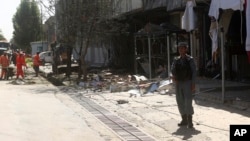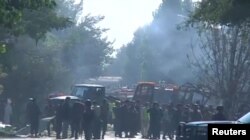A Taliban suicide car bombing has killed at least 35 people and injured dozens more in the Afghan capital, Kabul.
An Interior Ministry spokesman, Najib Danish, while confirming the casualties, explained that a bomber rammed his explosives-laden vehicle into a minibus packed with civilian government workers in a western part of the city.
The blast took place while the bus was passing through a crowded marketplace, inflicting casualties on shopkeepers and passers-by, eyewitnesses told reporters.
Hospital officials expected the death toll to rise.
A Kabul police spokesman told VOA the victims were mostly employees of the mining and petroleum industry.
The Taliban swiftly took credit for plotting the violence, claiming its bomber targeted two minibuses carrying personnel of the Afghan intelligence agency, or NDS, and 38 of them were killed.
Afghan President Ashraf Ghani condemned the bombing of civilians as appalling and cowardly.
Amnesty International has denounced the attack on civilians, saying it constituted a war crime and demanded the Afghan government ensure protection of its citizens.
“A record number of civilians have been killed in the first half of this year, with women and children being the worst affected. And neither the Afghan government nor the international community is paying enough attention to their plight,” the rights watchdog lamented while responding to Monday’s attack.
The U.N. Assistance Mission in Afghanistan documented nearly 1,700 civilian deaths from January 1 to June 30, with Kabul accounting for 20 percent of the casualties.
Monday’s deadly blast came amid revelations by the Taliban that one of the three suicide bombers who attacked Afghan forces in the southern Helmand province this past week was the middle son of Hibatullah Akhundzada, the supreme leader of the Islamist insurgency.
The 22-year-old bomber was identified as Abdul Rahman who had signed up for a suicide mission a year ago, say Taliban sources and independent Afghan researchers.
Government officials, however, dismissed the claims as untrue and propaganda. The Afghan government has along alleged that Taliban leaders and their families reside in neighboring Pakistan and in the gulf state of Qatar.
Observers say, if true, the claim would boost credibility of the Taliban chief, who has struggled from the outset to maintain unity among insurgent ranks. It would also give insurgents additional fuel to intensify their propaganda in a country where rulers have long been under fire for keeping their families out of violence-hit Afghanistan.
The Taliban has also stepped up battlefield attacks across most of the 34 Afghan provinces. The insurgents overran several more districts this week, increasing their territorial influence in the country where the government is in control of less than 60 percent of the territory.





